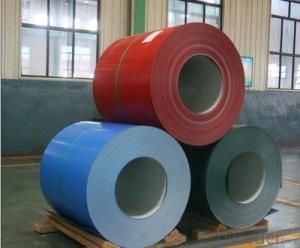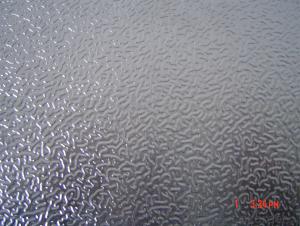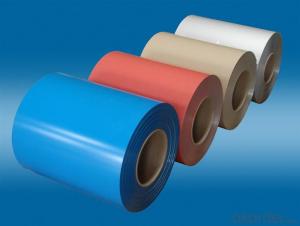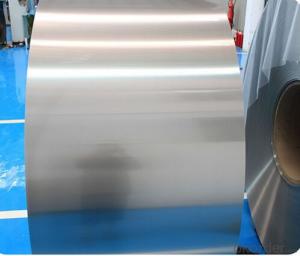Coated Aluminium Coils 3003 H14 for Metal Walls
- Loading Port:
- Shanghai
- Payment Terms:
- TT OR LC
- Min Order Qty:
- 5 m.t.
- Supply Capability:
- 10000 m.t./month
OKorder Service Pledge
OKorder Financial Service
You Might Also Like
Item specifice
1. Structure of Coated Aluminium Coils 3003 H14 for Metal Walls Description
• Product: Aluminim coils
• Application:
corrugated roofs, outer walls, ovens, electrically controlled cabinets.
household appliances, transportation, base plate, color coating.
industrial freezers in the residential and industrial buildings.
refrigerator backplane, gas stove, air conditioner, microwave, LCD border.
• Advantage: Full production line with all kinds of coils supply
2. Main Features of the Coated Aluminium Coils 3003 H14 for Metal Walls
• Our goods quality is top, the surface is smooth, and every steel coil
• No Joint, No Bends, no spots, no roller marks.
• MTC will be provided with goods, third part inspection is acceptable, for example, SGS, BV. Etc
3. Coated Aluminium Coils 3003 H14 for Metal Walls Images
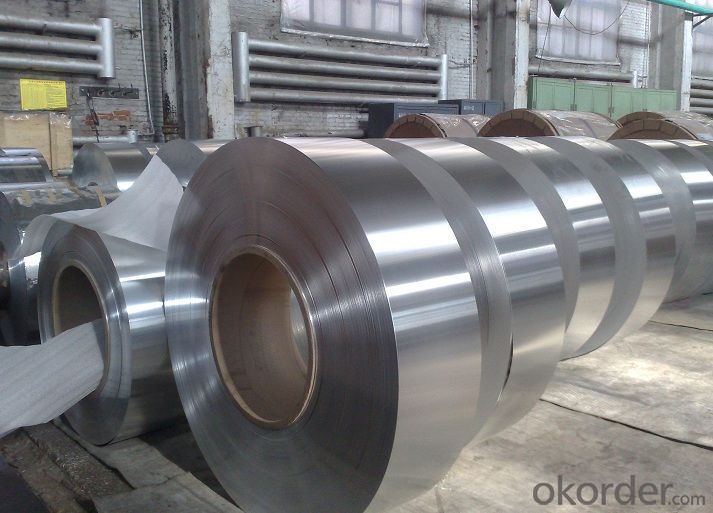
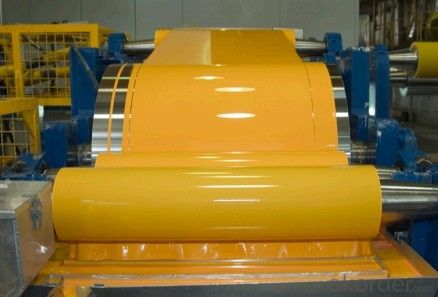
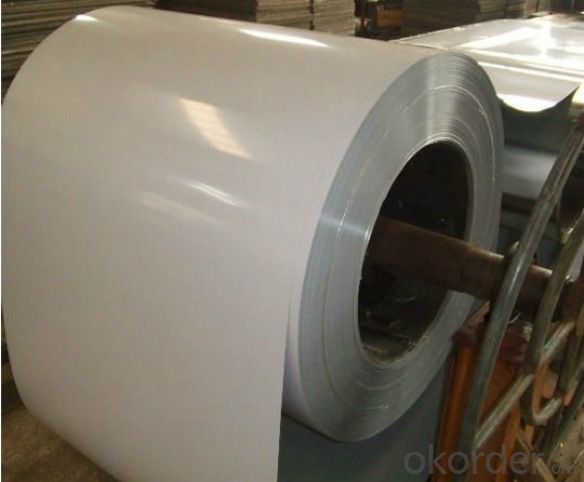
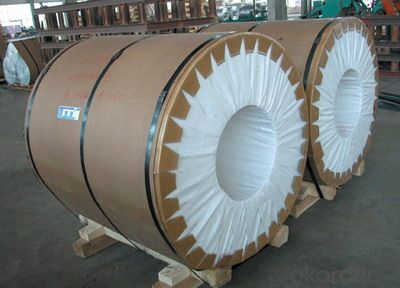
4. Coated Aluminium Coils 3003 H14 for Metal Walls Specification
Alloy | AA1050/1100/3003/3005/3105/5005/5052 etc |
Thickness | 0.03mm—4.0mm |
Width | 10mm—1600mm |
Coating | PVDF, PE |
Coatingthickness | Usually16-25 micron, could be 33-40 micron |
Color | According to Ral |
Standard | ASTM-B 209 GB/3008-2006 |
Usage/ApplicationsCoated Aluminum Coil/Sheet | Constructionand decoration, electronic appliances, lighting decoration, air-condition airpipe, sandwich panels and drainage, etc |
5.FAQ of Coated Aluminium Coils 3003 H14 for Metal Walls
We have organized several common questions for our clients,may help you sincerely:
① How about your company?
A world class manufacturer & supplier of aluminum coil and alloy blanks. Aluminum production base is comprised of 18 aluminum annealers, 10 coil and foil mills, 4 continuous production lines, 2 hot rolling production line and 3 prepainted lines.
Export 5000 tons per month to Asia, America and Middle East. Always do the best for our clients.
②Can you guarantee the quality of the products?
We are responsible for the quality of materials to get a long-term cooperation with clients in a reasonable period of time and we are glad to arrange and coordinate any third party inspection for you.
③What is the delivery time after purchase?
35 day after receiving client’s deposit or correct LC
- Q:I would like to know why the ionic substance aluminium oxide doesn't dissolve in water.
- Aluminium gives away 3 electrons, and two aluminium atoms are combined with 3 oxygen atoms, the charge is just to great for it to gracefully dissolve.
- Q:What are the different coil packaging sizes available for aluminum coils?
- The customer's specific needs and requirements determine the available packaging sizes for aluminum coils. However, standard coil packaging sizes are generally found in the market. These sizes vary in dimensions and weights, ranging from small to large. Various common coil packaging sizes for aluminum coils include: 1. Small coils: These serve smaller applications or projects and typically have a diameter of 200-300mm and a weight of 50-150kg. 2. Medium coils: Suitable for medium-sized applications and projects, these coils usually have a diameter of 300-600mm and a weight of 150-500kg. 3. Large coils: Designed for larger applications or projects requiring a substantial amount of aluminum, these coils typically have a diameter of 600-1200mm and a weight of 500-2000kg. It's important to note that these are general guidelines, and the actual coil packaging sizes may vary depending on the manufacturer and specific customer requirements. Moreover, unique project needs often allow for the request of custom packaging sizes.
- Q:How are aluminum coils manufactured to specific dimensions?
- Precision engineering and cutting-edge technology are utilized to manufacture aluminum coils with specific dimensions. The process commences with the selection of high-quality aluminum ingots, which are subsequently melted and cast into long, flat strips. Upon achieving the form of flat strips, the aluminum undergoes a sequence of rolling operations. The strips pass through a rolling mill, gradually decreasing in thickness and elongating in length. This rolling process is instrumental in attaining the desired dimensions and thickness for the coils. Following the initial rolling, the strips undergo annealing, a process involving heating the aluminum to a specific temperature and then cooling it slowly. This procedure enhances the ductility and reduces internal stresses in the metal, making it more manageable for subsequent manufacturing steps. The subsequent step is slitting, which involves cutting the wide strip into narrower strips of the desired width. High-precision slitting machines ensure accurate and consistent dimensions for each coil. Additionally, edge trimming is performed during the slitting process to eliminate irregularities and ensure straight edges. Once the narrower strips are obtained, specialized machines are utilized to coil them. These machines carefully wind the strips into coils of the desired size and shape, ensuring secure and tight winding. To further enhance dimensional accuracy, the coils may undergo a final leveling process. This process entails passing the coils through a machine that applies pressure to flatten any irregularities or distortions in the metal, ensuring a uniform and consistent thickness. In summary, the manufacturing of aluminum coils with specific dimensions necessitates a combination of precision rolling, slitting, coiling, and leveling processes. These processes, in conjunction with advanced machinery and quality control measures, guarantee that the final product meets the precise specifications required by the customer.
- Q:Is it possible to customize the dimensions of aluminum coils?
- Yes, it is possible to customize the dimensions of aluminum coils. Aluminum coils can be fabricated and cut to specific dimensions according to the requirements and specifications of the customer. The customization process involves precise cutting and shaping of the aluminum coil to achieve the desired dimensions. This allows for flexibility in various industries and applications where specific coil sizes are necessary. Customizing the dimensions of aluminum coils ensures that they can fit seamlessly into different production processes, machinery, or end-use applications.
- Q:What are the different coil slitting methods used for aluminum coils?
- Aluminum coils can be slit using various methods, each offering distinct advantages and applications. Here are a few commonly used techniques: 1. Rotary Shear Slitting: Employing rotating circular knives, this method achieves precise and speedy cutting of aluminum coils into narrower strips. It is ideal for high-volume production of consistently sized narrow strips. 2. Loop Slitting: This method involves passing the aluminum coil through a loop, where rotating knives make the cuts. Loop slitting enables fast processing while minimizing the risk of surface damage, making it suitable for thinner gauge coils. 3. Double Knife Slitting: Using two blades, this technique makes parallel cuts along the length of the aluminum coil. It is best suited for thicker gauge coils and can produce wider strips compared to other methods. 4. Scissors Slitting: This versatile method deploys a pair of scissors-like blades to cut the aluminum coil into strips. It can handle a wide range of coil thicknesses and is commonly used in smaller scale operations or when precise width tolerances are not critical. 5. Crush Slitting: Here, the aluminum coil is pressed against a hardened roller or blade, causing it to deform and rupture along the desired cutting line. Crush slitting is ideal for delicate materials or when minimal burr formation is desired. Each slitting method has its own advantages and limitations, and the choice depends on factors such as coil thickness, desired strip width, production volume, and surface quality requirements. Selecting the appropriate method is crucial for efficient and accurate slitting of aluminum coils.
- Q:What are the potential applications of colored aluminum coils?
- Colored aluminum coils have a wide range of potential applications. They can be used in the construction industry for cladding, roofing, and facades, adding aesthetic appeal to buildings. In the automotive industry, colored aluminum coils can be used for interior and exterior trim, giving vehicles a sleek and modern look. They can also be utilized in electronics for manufacturing casings and decorative elements. Additionally, colored aluminum coils have applications in the signage and advertising industry, as well as in the production of household appliances, furniture, and decorative items.
- Q:Can aluminum coils be used in the production of solar reflectors?
- Yes, aluminum coils can be used in the production of solar reflectors. Aluminum is a commonly used material in the manufacturing of solar reflectors due to its high reflectivity and durability. The coils can be processed and shaped into the desired form for the reflector, allowing for efficient reflection of sunlight onto the solar panels. Additionally, aluminum is lightweight, making it easier to handle and install in solar reflector systems.
- Q:What are the various surface finishes available for aluminum coils?
- There are several surface finishes available for aluminum coils, each catering to different needs and preferences. Some of the most common surface finishes include: 1. Mill Finish: This is the most basic and natural finish that aluminum coils come with. It has a smooth, shiny appearance and is achieved by passing the coil through a series of rollers during the manufacturing process. 2. Anodized Finish: Anodizing is an electrochemical process that adds a protective layer to the surface of the aluminum coil. It can be done in various colors and provides enhanced resistance to corrosion, abrasion, and wear. Anodized finishes are commonly used in architectural applications. 3. Painted Finish: Aluminum coils can be coated with paint to provide an aesthetic appeal and offer additional protection against environmental elements. The paint can be applied in various colors and finishes, such as matte, glossy, or metallic. 4. Brushed Finish: This finish is achieved by brushing the surface of the aluminum coil with abrasive materials, resulting in a textured appearance with fine lines or scratches. Brushed finishes are often used in decorative applications, as they give a unique and stylish look. 5. Polished Finish: Polishing involves buffing the aluminum coil's surface to create a smooth, reflective finish. It gives a mirror-like appearance and is commonly used in decorative and architectural applications where a high-end, elegant look is desired. 6. Embossed Finish: Embossing is a process in which the aluminum coil's surface is stamped or pressed with a pattern or design. This finish adds texture and depth to the coil, making it suitable for applications that require a decorative or non-slip surface, such as flooring or signage. 7. Laminated Finish: Lamination involves bonding a thin layer of film or foil onto the surface of the aluminum coil. This finish provides additional protection against scratches, stains, or UV radiation. It is commonly used in applications that require durability and resistance to harsh conditions. These are just a few examples of the various surface finishes available for aluminum coils. The choice of finish depends on the specific application requirements, desired appearance, and functional properties needed for the end product.
- Q:I am looking for a deoderant that doesn't contain aluminum that actually works. I have tried Tom's natural deoderant and didn't get to use it long enough to see if it worked because it really irritated my skin and caused it to burn and peel. I have also tried the one made by Adidas and it seemed to work pretty well through the winter months, but now that it is getting warm again I'm noticing that it isn't quite doing the job anymore.
- aluminum zirconium is the chemical that makes you stop sweating, not that it works on most people. they can only put a certain percentage of it in deodorants, try the degree clinical, i just started using it and it seems to be doing okay, good luck i know what you are going through.
- Q:Are aluminum coils suitable for food and beverage packaging?
- Yes, aluminum coils are highly suitable for food and beverage packaging. Aluminum is a safe and durable material that helps protect the quality and freshness of food and beverages. It is non-toxic, corrosion-resistant, and provides an effective barrier against moisture, oxygen, and light. Additionally, aluminum coils are lightweight, easily moldable, and can be easily shaped into various packaging formats, making it a popular choice for the food and beverage industry.
1. Manufacturer Overview |
|
|---|---|
| Location | |
| Year Established | |
| Annual Output Value | |
| Main Markets | |
| Company Certifications | |
2. Manufacturer Certificates |
|
|---|---|
| a) Certification Name | |
| Range | |
| Reference | |
| Validity Period | |
3. Manufacturer Capability |
|
|---|---|
| a)Trade Capacity | |
| Nearest Port | |
| Export Percentage | |
| No.of Employees in Trade Department | |
| Language Spoken: | |
| b)Factory Information | |
| Factory Size: | |
| No. of Production Lines | |
| Contract Manufacturing | |
| Product Price Range | |
Send your message to us
Coated Aluminium Coils 3003 H14 for Metal Walls
- Loading Port:
- Shanghai
- Payment Terms:
- TT OR LC
- Min Order Qty:
- 5 m.t.
- Supply Capability:
- 10000 m.t./month
OKorder Service Pledge
OKorder Financial Service
Similar products
New products
Hot products
Hot Searches
Related keywords
